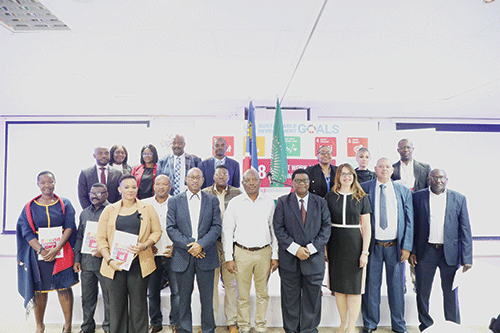Labour minister Utoni Nujoma says although the fisheries sector plays an important role in Namibia’s economy, it has been marred by challenges, including issues relating to decent work, occupational health, and safety, forced labour, violence and harassment on some vessels using Namibian ports.
He said it is crucial that adequate and appropriate measures to promote good basic conditions of employment are recognised and there is a need to prevent accidents and diseases at work.
“It is disheartening to know that these measures are often not available, especially in some organisations where employee welfare, safety and health are ignored and not prioritised,” stated Nujoma.
He added: “When workers are treated fairly, paid a decent wage, and provided with safe working conditions and environment, they are more productive, profitable and contribute more effectively to the economic growth.”
Nujoma noted that the sector provides employment and uplifts the livelihood of many people.
“The status of employment relations in the fishing sector remains unabated, we are all aware that decent work is not just a moral imperative, it is also essential for sustainable development,” he said at the launch of the the National Coordination Mechanism on Decent Work in the Namibian Fisheries sector yesterday at Walvis Bay.
The event also saw the hosting of a Business Forum on Advancing Decent Work in the Namibian Fisheries Supply Chain.
Nujoma stated that the purpose of those interventions is a commitment by the government to create awareness, discuss issues that pave ways for improvement, and promotion, and bring about opportunities in the Namibian fisheries supply chain.
Additionally, the forum presented an opportunity for Namibian businesses to explore the existing local and international markets and enhance business sustainability and diversification.
He said the government has put some measures in place to address the status of the fishing industry, including the development of a toolkit on the fisheries supply chain and many simplified information leaflets on How to stay safe while working on a fishing vessel at sea.
“Certification of 42 labour inspectors on basic safety at sea and familiarisation to conduct inspections on board vessels as required by national law. The standardized employment contracts for the fishers jointly developed by the tripartite, based on national labour legislations in terms of basic condition of employment, and occupational safety and health and considering the ILO Work in Fishing Convention 2007 (No188),” stated Nujoma.
He added that the employment contract will not only provide job security and better working conditions for fishers but will instil fair treatment and protection from labour exploitation and further support Namibia’s compliance.
Specialist in the transport and maritime sectors Christine Bader said Namibia will need to hold the course to the destination of decent work in the fishing sector, including full and ongoing compliance with Convention 188.
“Thanks to your commitment and dedication, you are now taking this bold step forward and converting this project-related platform into the National Coordination Mechanism (NCM), a standing tripartite sectoral body that will act as the coordination mechanism required under the Work in Fishing Convention No 188,” she highlighted.
Bader said the efforts are also important in the context of the current due diligence debate in the EU according to which companies are required to prevent and address negative impacts on the environment and human rights including labour rights, in their value chains, and the fish value chain. – psiririka@nepc.com.na


